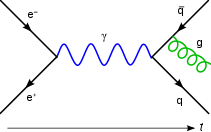| Quantum field theory |
|---|
 |
| History |
In quantum field theory, the mass gap is the difference in energy between the lowest energy state, the vacuum, and the next lowest energy state. The energy of the vacuum is zero by definition, and assuming that all energy states can be thought of as particles in plane-waves, the mass gap is the mass of the lightest particle.
Since the energies of exact (i.e. nonperturbative) energy eigenstates are spread out and therefore they are not technically eigenstates, a more precise definition is that the mass gap is the greatest lower bound of the energy of any state which is orthogonal to the vacuum.
The analog of a mass gap in many-body physics on a discrete lattice arises from a gapped Hamiltonian.